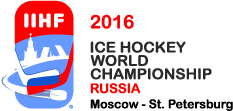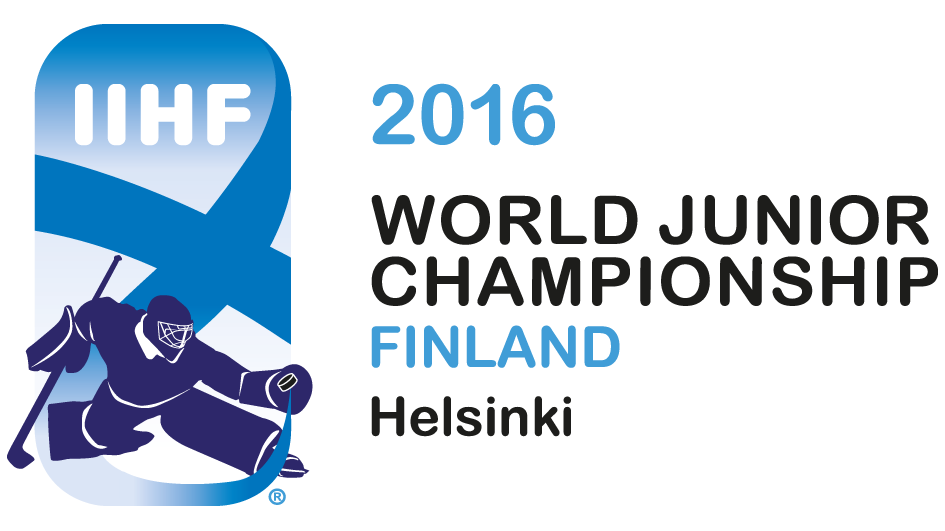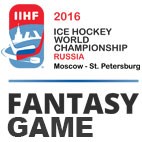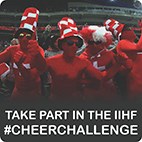Five-year drought ends
Five-year drought ends
Germany returns to QF for first time since 2011

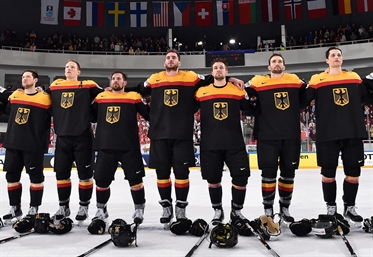 ST. PETERSBURG, RUSSIA - MAY 16: Team Germany enjoys their national anthem after a 4-2 win over Team Hungary during preliminary round action at the 2016 IIHF Ice Hockey World Championship. (Photo by Minas Panagiotakis/HHOF-IIHF Images)
ST. PETERSBURG, RUSSIA - MAY 16: Team Germany enjoys their national anthem after a 4-2 win over Team Hungary during preliminary round action at the 2016 IIHF Ice Hockey World Championship. (Photo by Minas Panagiotakis/HHOF-IIHF Images)
When coach Uwe Krupp’s team fell 5-2 to Sweden in the 2011 quarter-final in Bratislava, Slovakia, “Party Rock Anthem” was the hottest global pop song, the Game of Thrones TV series had just debuted on HBO, and the Boston Bruins and Vancouver Canucks were marching to the Stanley Cup final.
Yeah, it’s been a while. So what has sparked the turn-around this year?
“We have a new coach, so I think everybody wants to come to the national team and everybody wants to play for our country,” said veteran winger Philip Gogulla after Monday’s 4-2 win over Hungary to close out the round-robin. “I think this is the most important thing.”
Gogulla might have a point. With Marco Sturm behind the bench, Germany has earned some key victories, defeating the United States for the first time since 2010 and Slovakia for the first time since 2011. As the highest-scoring and longest-serving German player in NHL history (242-245-487 in 938 games), Sturm didn’t just bring a relentless work ethic to the rink. He also showed up with a smile on his face. His will to win is carrying over here in St. Petersburg.
You can sense a palpable enthusiasm from this squad about Sturm, barely removed from his playing days at age 37. He has a two-year contract as both head coach and general manager, running through the 2017 IIHF Ice Hockey World Championship in Cologne, Germany and Paris, France. If Germany succeeds at the September qualification tournament for the 2018 Olympics in PyeongChang, Korea, that contract will be extended to 2018.
Here and now, Sturm is succeeding without having fundamentally altered the blue-collar, grind-it-out character of the German team. After all, 11 of the players who have suited up for him here also participated in the 14th-place disaster under Pat Cortina in 2014 in Belarus. And there are seven returnees from the 2011 quarter-finalists.
Germany’s three scoring leaders with seven points apiece are Gogulla, Felix Schutz, and Patrick Hager, and all are long-time national team veterans. A nifty newcomer like EHC Munchen’s Dominik Kahun (four points) adds variety to the attack, but isn’t a game-changer on par with, say, 18-year-old Finnish sniper Patrik Laine.
Ultimately, this is about Germany doing what Germany does – just better than usual, individually and as a team. Hager, for instance, had just one goal and three assists in 26 World Championship games prior to this year. With 22 goals in seven games, this German team has already produced more offence than any other since 2002 (25 goals in seven games en route to eighth place under ultra-defensive coach Hans Zach).
When asked to assess what has changed compared to previous flops, German captain Marcel Goc said: “I think we probably did a better job of sticking to the game plan and trusting our game plan. Games internationally are tight. In the first game and second game, we were kind of so-so and lost both games [3-2 to France in a shootout and 5-1 to Finland]. Then we picked up our tempo, our team game.”
Looking back, Germany had a slightly different downfall in each of its non-quarter-final years since 2011.
In 2012 in Stockholm, Sweden, uncharacteristically awful defence hurt coach Jakob Kolliker’s team. Germany never got back on track after dropping a 3-2 decision to Latvia in its second game. The nadir was a 12-4 loss to Norway, in which sniper Patrick Thoresen racked up six points. Germany came twelfth after falling 8-1 to the Czechs in its group closer.
2013 in Helsinki, Finland was a case of close-but-no-cigar. Germany started off with a 4-3 overtime loss to Finland and ended by beating France 3-2 on Christian Ehrhoff’s OT goal. But although Germany collected points in four out of seven games and never lost by more than three goals, it wasn’t enough. Cortina settled for a ninth-place finish in his maiden voyage behind the German bench.
In 2014, the Germans totalled the same number of goals as in 2013 (13), but allowed seven more, going from 16 to 23. After beating Kazakhstan and Latvia in their first two games in Minsk, they lost five straight en route to 14th place. One of the few bright spots was World Championship rookie forward Thomas Oppenheimer (4-2-6).
Last year in the Czech capital of Prague, the German goal difference sagged to 11-24 in Cortina’s swan song. Games like the 1-0 loss to Switzerland and the 3-2 shootout loss to Austria epitomized this squad’s lack of scoring at key times. And German starting goalie Dennis Endras recorded a 3.15 GAA and 87.8 save percentage, unable to live up to the legend he forged on home ice during the 2010 Worlds as Best Goalie and tournament MVP en route to fourth place. In 2015, the Germans bowed out in tenth place.
How about 2016? Germany hasn’t just made the quarter-finals, but is also seeded third in Group B. Whether or not that’s a blessing is unknown. Prior to Tuesday’s group-closing action, Germany’s potential quarter-final opponents included the Czech Republic, Sweden, and host Russia. Thomas Greiss is the first regular NHL netminder to suit up for Germany (2.36 GAA and 92.5 save percentage for the New York Islanders in 41 games this season) since the heyday of Olaf Kolzig. He can expect plenty of work in Thursday’s do-or-die matchup, regardless of who Germany faces.
“It doesn’t matter what happened in the past,” said Goc. “Yeah, we’re happy we’ve moved on to the next round. But we can’t be satisfied with that. We know it’s going to be a tough nation and we’re probably going to be the underdog in that quarter-final game. But we’ve just got to throw everything against them that we have. We know Greisser, our goalie, is going to stand on his head for us. We have to wait until we get our chances and hope we can bury some.”
Germany’s character will be tested. At forward, they’ll have to play without Tobias Rieder (Arizona Coyotes) due to a knee injury and Gerrit Fauser (Grizzlys Wolfsburg) due to an injured shoulder. In addition, defenceman Torsten Ankert (Kolner Haie) is out with a hip injury.
Excited about the end of the five-year playoff drought, German fans are hungry for some success. Who could emerge as a hero in this quarter-final? The last time Germany prevailed in one was in Mannheim in 2010, and Gogulla legendarily got the 1-0 winner versus Switzerland. What does the 28-year-old Kolner Haie star foresee for the upcoming elimination game?
“Everything is possible.”
Back to Overview

